eucharist
SOIL AND SACRAMENT is Fred Bahnson’s story of finding God through sustainable farming. A trained theologian, he learns to best live out his faith with shovel in hand, practicing a method of permanent agricultural design principles called “permaculture.”
We follow him through the liturgical year on an agrarian pilgrimage from one faith community to another, digging into the big question of how to best love his neighbor. His answers are uncovered through building relationships and healthier soil, communing with others and his Creator in the field. From jail cell to monastic cell, from a rooftop in Chiapas to his four-season greenhouse, Bahnson finds the intersection of community and solitude between the field rows. Just like the first Adam from the adamah (earth), we learn how to give more to the soil than we take away and to reverently observe the garden as fruitful and multiplying. “Human from humus”—he had me at hugelkultur. (Look it up—it’s really cool.)
Bahnson begins his pilgrimage in a Trappist monastery in South Carolina during Advent, joining the brothers in prayer and mushroom-growing practices, entering the dark cold winter silence of vigils and the soil. Bahnson then flashes back to 2001, to Holy Week in Chiapas with a Christian Peacemaker Team accompanying the Mayan Christian pacifist civic group Las Abejas—“The Bees.” In Chiapas we sit and eat with Bahnson on Maundy Thursday, corn tortillas and slow-cooked black beans made into holy elements, partaking of an “ancient and unnamed liturgy,” eating our way into mystery. Bahson ordains the creatures of the earth as perennial ministers of the soil, notes the transubstantiation of seed and potluck as Eucharist. He writes of beginning to think of growing food as the embodiment of loving his neighbors, the journey of the liturgical calendar through the mystery of soil. The book is a slow dance, a cosmic one-turn around the sun.
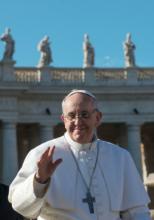
VATICAN CITY — Since mid-July, Pope Francis has been using Communion wafers made by an Argentine prisoner in the daily Mass he celebrates at the Vatican’s Santa Marta residence.
The hosts are made by Gabriela Caballero, a 38-year-old woman who is serving a seven-year jail term in the San Martin Penitentiary outside Buenos Aires.
Her story was revealed by the Argentine news agency NOVA and picked up by Il Sismografo, a blog with close connections to the Vatican.
Caballero gave the hosts, together with a long letter to the pope, to Bishop Oscar Ojea of San Isidro, who regularly visits the prison. Ojea, in turn, delivered the hosts to the pope on July 16 during a visit to the Vatican.
Francis began using the hosts on July 18; the day after he wrote back to Caballero, thanking her for the gift.
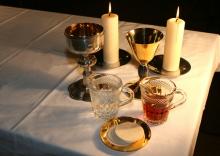
So you’ve heard the flu shot is somewhat ineffective this year, and, though you have a normal immune system, you don't want to take the Eucharist from a common chalice.
Part of me kind of wants to slap you.
Obviously, that's not what Jesus would do. We know what Jesus did — he offered you his lifeblood, saying "This is my blood of the covenant, which is poured out for many." Ever after, Christians have taken wine and bread, a sacrament which binds us together in communion with other Christ-followers around the globe and through two millennia.
For the last few months, because my cancer treatment had decimated my immune system, I haven't been able to drink from the common chalice (or to eat most raw food, go to the movies, or get on the bus without a face mask). I really miss it. So I want to share two key insights I’ve had about the common Eucharistic cup.

When it comes to sharing the Eucharist among faithful but separated Christ followers, I wonder if Jesus is waiting for the churches simply to be the Church?
For the sake of this uncommon meal and the One who gives himself to us in it we can partake together, not on the shaky foundation of our present tragic divisions but on the firm ground of our promised unity by joining now in the Great Feast we will celebrate with him forever in eternity.
It is, after all, his table. It is a table set not only in the presence of our enemies in this world but set also in the unseen realm of Christ’s anticipated future rule that in a mystery comes to each of our houses of worship simultaneously as we gather in hope to encounter his resurrected person, week in and week out.
In this scenario, we remain mindful and respectful of our present divisions yet act on the coming unity we know is ours now by promise because no prayer of Jesus, certainly not his prayer that we be "one," can ever fail (John 17).

I’m known for holding an alternative view on salvation than many Christians – even Disciples — maintain, in that I do not adhere to the doctrine that Jesus died for our sins. I know there are lots of scriptures to back this position, and one can also use scripture to justify other explanations for Jesus’ death. As many of us have seen, the Bible can be, and has been, used to justify nearly any position we care to use it to support. As for me, I’ve done years of searching, praying, discussing, and reading, and my conclusion is that it is the love of God as manifest by Jesus that is redemptive, and not Jesus’ blood.
I know some folks will likely stop here, discrediting anything else I have to say because of this perspective, which is unfortunate, but which I also understand. But a family member recently asked me about my take on communion if, in fact, I don’t ascribe to the idea that Jesus was saying “this is my body broken and my blood poured out for the remission of your sins.”

Whether your guy won or whether your guy lost, do any of us believe that politicians or the political process can unite us or solve our nation's deepest troubles (the most serious of which are not economic)?
If you feel great or you feel lost, is your honest hope in a political messiah? Can our political leaders give us a vision of human flourishing that comes close to the personal and societal transformation available to us right now in the New Creation accomplished by the life, death, and resurrection of Jesus Christ?
These idols we fashion, these men and women we are tempted to worship or in which we place our ultimate confidence, cannot heal us or bind up the wounds of America.
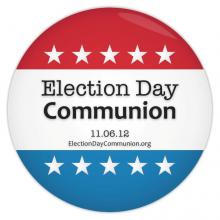
Tuesday, Nov. 6, is Election Day. As we’ve seen these past months, in a closely divided country, elections bring out the worst in us. Hundreds of millions of dollars in negative advertising, families and churches divided, each side convinced that a victory by the other side will be disastrous for the country.
It is clear that Christians will vote in different ways — some for Barack Obama, some for Mitt Romney, some for another candidate, and some will not vote. But Tuesday evening, Christians in more than 800 congregations will be gathering together for communion, regardless of party, political affiliation, or denomination.
The Election Day Communion campaign is the vision of several pastors to build unity in Christ in the midst of theological, political, and denominational differences. In sharing communion together, the Campaign says, Christians can reaffirm our allegiance to Christ and remember some basic truths.

I love food. I love food even more when it's shared with people. Some of my fondest memories with friends and family happened while sharing food. My husband and I shared our first date over a meal, and we got engaged over a meal. There's something about sitting around a table partaking in sustenance for our bodies that also fills our soul and our hearts. That's probably why I love communion so much.
So I was struck by Paul’s anger over food in 1 Corinthians 11. Granted, Paul comes off angry in other letters as well, but this one I decided to linger on for awhile because of verse 27: "Whoever, therefore, eats the bread or drinks the cup of the Lord in an unworthy manner will be answerable for the body and blood of the Lord."
Paul's letter is directed to a community in Corinth that was made up of the poor, the working class, and the rich. They lived together, shared communion with each other, and sought to be a community that reflected Christ. Now, this doesn’t seem too different from what we do at church today. But unlike how we celebrate communion — as it’s own “event” during service — for the 1st century Christians, communion was part of a real meal.
So what could be so "unworthy" about this shared meal?
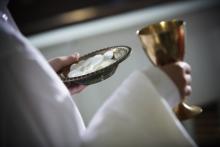
As an ecumenist I listened to (and largely bought) the notion that taking Communion with other Christians in the absence of institutional unity was tantamount to premarital sex, to an intimacy that should not be attempted because we were not — as disagreeing Christians — properly wed to each other yet.
But the more time I spend as a day-to-day trenches brand of pastor living out the faith in the real world, I find this argument holds less and less water.
A reality I have come to grips with after decades of personal ecumenical involvement is the same reality that leaders at the highest levels of churches have been wrestling with for centuries: The age-old pursuit of doctrinal unity under an authoritative “true church” will likely never occur before the Second Coming.
Another reality — a more personal one — has hit me with full force. This division at our Eucharists inflicts pain upon those of tender conscience and deep love for Christ and his bride. They are broken upon the rocks of our divisions and it is a scandal.
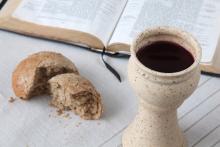
Every three years, the assigned readings during the summer include five weeks of working our way through the Gopel of John, chapter 6, and what is called the "Bread of Life Discourse." And let’s just say that if Trey Parker and Matt Stone wrote a musical called The Book of John they’d have plenty of material from just this chapter alone.
In the last five weeks we’ve gone from the feeding of the 5,000 to Jesus walking on water in the middle of a storm at sea — by the way, Jesus walks on water during a storm at sea so often in the gospels that I’ve started thinking it was less about being miraculous and more about just getting in some cardio — anyhow, the crowd chased him down, demanding more bread, and then he goes and says that he is the Bread of Life come down from heaven (which angered the nice religious folks), and rather than backing off, he makes it even weirder by saying whoever eats his flesh and drinks his blood has eternal life.
Which is where we pick up today when some of his disciples are like, “Uh Jesus, that teaching is HARD…who can accept it?” And many of them leave. And I have to say, I don’t really blame them.
This teaching IS hard. But honestly, Jesus had a lot of sayings that were HARD. Sayings such as, " Love your enemies and pray for those who persecute you," "You who are without sin cast the first stone," "Sell all you have and give it to the poor," "The first shall be last and the last shall be first," and "If you seek to save your life you will lose it."
I totally understand the reaction of these disciples who say these teachings are hard, who can accept them?
But this week I started to wonder if maybe those disciples didn’t have to leave Jesus … I mean, when we make the accepting of hard teachings the litmus test for being a follower of Jesus, I wonder if we are perhaps missing the point altogether.

When Harper was born we decorated the nursery in a Noah’s Ark theme…images of Noah and of animals entering a large wooden boat two-by-two. It’s a common enough decorating scheme for kids' rooms.
I mention it because this week at Bible study we discussed how weird it is that the beheading of John the Baptists isn’t a common decorating scheme for kid’s rooms.
Because this is just too gruesome a tale to show up on rolls of juvenile wall paper.
In case you missed the details, here’s what happened:
So Herod is the ruler of the region, and while vacationing in Rome he gets the hots for his brother’s wife who he then marries. John the Baptist, then suggests that maybe that’s not ok.
Now, Herod likes John, as much as anybody can like a crazy bug-eating prophet who lives outdoors and speaks consistently inconvenient truths. Truths such as it’s not ok to marry your brother’s wife, which, incidentally, is the truth that when spoken, got him arrested to begin with.
It also got John on the bad side of Herod’s new illegal wife Heroditas. She did not like John. Then when Herod throws himself a big birthday party his daughter-in-law Salome dances for him and all the other half-drunk generals and CEOs and celebrities who were there.
We don’t know the exact nature of her dance but we do know that it “pleased” Herod enough that he offered to give her anything she wanted up to half of his kingdom. So, you know, I don’t think it was the Chicken dance.
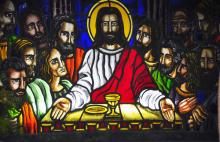
In a column Sunday in the U.K.'s Guardian newspaper, Giles Fraser, the former canon chancellor of St. Paul's Cathedral, set a discussion about the Church of England and its stance toward gay marriage within the context of the Eucharist, saying, "The parish church opens up the jollof rice and communal wafers to all comers, shouldn't we do the same with the marriage feast?"
Fraser continued,
The problem with the CofE on the gay issue is not that it doesn't practise what it preaches but that it doesn't preach what it practises. And orthopraxy (what you do) is more properly basic than orthodoxy (what you think). In practice, the CofE has a reasonably good track record of opening up the jollof rice and the communion wafer to all comers – and certainly better than its official pronouncements would lead onlookers to believe. So why is there such a huge gap between the CofE at parish level and the CofE as expressed by official pronouncements? During General Synod this week, the archbishops came under heavy fire from parish clergy for submitting a shockingly negative response to the government's same-sex marriage proposals in the name of the CofE, as if they constituted the CofE's views. They don't. The parish church is typically a more inclusive place than the church's leadership understand. Here there is neither rich nor poor, black nor white, gay nor straight. The archbishops are out of touch. The parish is the centre of gravity of the church.
Read the column in its entirety HERE.
Image: Stained glass window depicting the Last Supper by Antonio V. Oquias/Shutterstock.
 My generation is a practical generation, and I am challenged by my faith to be a practical person. Don’t get me wrong: I love all verbal and theological things: story, theology, politics, and history, perhaps even inordinately.
My generation is a practical generation, and I am challenged by my faith to be a practical person. Don’t get me wrong: I love all verbal and theological things: story, theology, politics, and history, perhaps even inordinately.
But I believe in places. I believe that relationships, rooted in love, transform us. And it just so happens that most lasting human relationships are formed around the table....
The table is a place where we bypass rank and privilege and create a zone where you take what you need and bring what you are able. It is a commons where we are defined in new, equal relationships with one another, ensuring that all have enough and sharing. Believers in Acts took the idea of the common table even further and held all possessions in common, caring for the widows and dispossessed from the surplus, bypassing the inequality created by the currency stamped with the deified Caesar.
"And all ate and were filled; and they took up what was left over of the broken pieces, twelve baskets full. And those who ate were about five thousand men, besides women and children." --Matthew 14:13-21
Immediately before the story of the feeding of the 5,000 is a description of a very different sort of meal: John the Baptizer's head on a platter. And just as women and children are included among the multitude fed on the beach (a detail unique to Matthew's version of the story), the female sex is also represented in the account of John's demise: Herodias, sister-in-law of Herod, asks for the head of the Baptist; her nameless daughter, with no detectable squeamishness, delivers the request to the king and serves up the plated head to her mother. (That women in all of their moral complexity are present throughout Matthew's gospel - recall also the women who appear in the genealogy of Jesus in chapter one -- is an observation worthy of closer scrutiny. See, for instance, Jane Kopas's 1990 essay in Theology Today).
This evening I will lead a Passover Seder observance in my Christian community. We've done it for years and always find it inspiring to reflect on God's liberation from slavery. And it's the occasion for a delicious potluck feast.
This week I saw an article written last spring on Jews' concerns over Christians celebrating Passover. It seems that more Christian churches are using "Christianized" versions of the seder, reinterpreting the meal's symbols to reflect Christian beliefs. Said one rabbi, "They take our symbols, our holiday, our ritual and start investing them in Christian meaning."
Last Sunday I got a call at 11 a.m. It was Rachel Pater calling from her home town church (denomination to remain unnamed). It took several minutes before she could form a proper sentence through her sobs. Finally in a shaky voice, this came out: "I'm at my parent's church ... they are doing communion ...